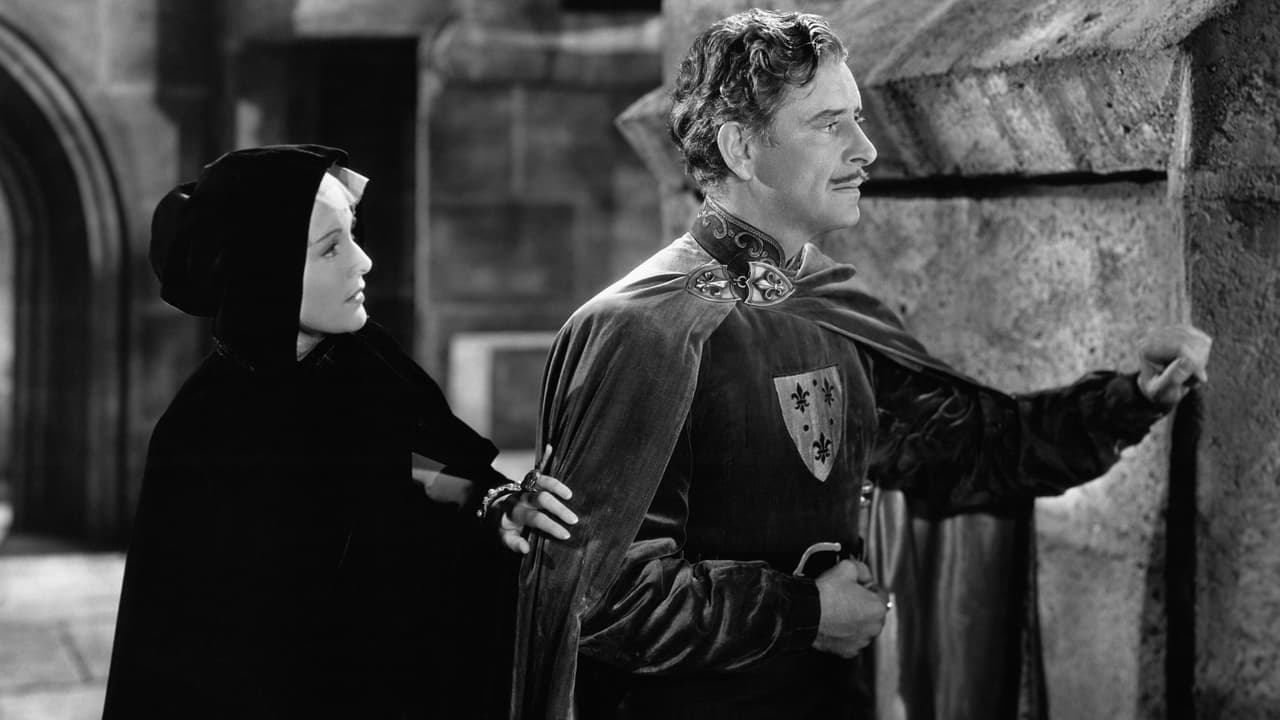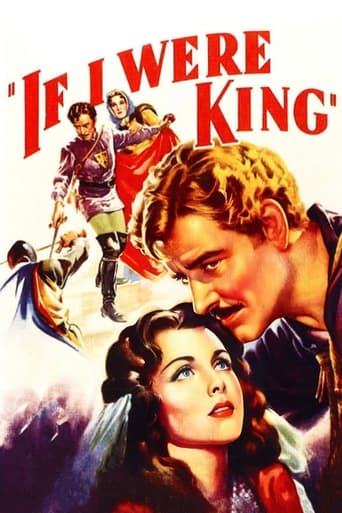

Copyright 11 November 1938 by Paramount Pictures, Inc. New York opening at the Paramount: 28 September 1938. U.S. release: 11 November 1938. Australian release: 11 February 1939. Sydney opening at the Prince Edward: 11 February 1939 (ran 5½ weeks). 100 minutes.NOTES: Basil Rathbone was nominated for a prestigious Hollywood award for Best Supporting Actor, losing to Walter Brennan in Kentucky. Also nominated for Best Sets (Adventures of Robin Hood); Best Original Music Score (Adventures of Robin Hood); and Best Sound Recording (The Cowboy and the Lady). COMMENT: Usually the trouble with historical spectacles is that they tend to be lavish but dull. This one is lavish all right but, aside from some tediously obligatory romantic escapades between Colman and Dee - which somewhat pale by comparison with the earlier more vital ones with Ellen Drew - it has a fascinating, witty and literate script by Preston Sturges. The character of the king has been drawn with sharp, acerbic strokes, enabling Basil Rathbone a right royal time with his witty, eccentric dialogue. Here is one of Rathbone's few character roles in which he has successfully buried his usual mannerisms - and accent. He is almost unrecognizable both in speech and figure - yet the change in his usual stance and delivery is highly effective.Colman is his usual self, perhaps a trifle more animated than usual. Contributions from the large support cast, particularly Walter Kingsford, John Ridgely, Sidney Toler and Heather Thatcher are more than a match for the script.As usual, the director excels with the staging of crowd scenes and the execution of scenes of pageantry and action - the arrival of the Burgundian envoy at court, the attempted flight from the palace, the rout of the invaders. So far as its wit, its delight in eccentricity, the historical self-consciousness of its characters and amusing tables-are-turned situations, the script is modeled along Shavian lines. Alas, it is less than Shaw in its conventional romantic notion of its poet/thief hero, in its wearisomely prolonged trial in masquerade (a stale situation which is played as if it were both amusing and new), and especially in its routinely dull romance.Still, the film is elaborately dressed, the visuals have a splendid drive, thanks to Lloyd's deft pacing and astute camerawork. Photography, art direction, costumes, special effects, music, film editing, sound recording are marvelous.
... View MoreWas there ever a greater villain than Basil Rathbone, who gave us such great performances as the abusive Mr. Murdstone in "David Copperfield" (1935), the deadly Tybalt in "Romeo and Juliet" (1936), evil Sir Guy in "The Adventures of Robin Hood" (1938), Baron von Frankenstein in "Son of Frankenstein" (1939) and the evil Captain Esteban in "The Mark of Zorro" (1940). From 1939 to 1946 he focused on Sherlock Holmes films with only an occasional second film in any given year. He made the transition early to TV where he was a popular guest star, and continued to do films (e.g., "We're No Angels", "The Last Hurrah").Yet in all the excellent work he did over the decades, you've never seen him like he appears in this film. You may not even recognize him despite his distinct looks and voice.The rest of the film is pretty ordinary, but fans of Basil Rathbone need to see it.
... View MoreRonald Colman and Basil Rathbone both starred in the memorable "Tale of 2 Cities," an outstanding film dealing with revolutionary France. 3 years later they appeared in this 1938 production and with his sort of meek way of speaking, a memorable walk but the hidden viciousness of the usual sinister Rathbone, it garnered him a supporting Oscar nomination.This film does not compare with the 'Cities' class of 1935. The writing in this film is not as good and with treachery abounding here, we should have seen more of a devilish attitude by all concerned here.Even the priest is subdued here in a part that could have shown a lot more relevance.
... View MoreColman was not only good looking, suave, sophisticated, and dashing, but he had a lyrical voice, an absolute necessity for a great actor. Recall the speech and voices of Peter O'Toole, James Mason, Richard Burton, Laurence Olivier: when they spoke, it was not mere prose but verse. So who better to play the poet, Francois Villon, than Ronald Colman, who possessed the voice of a poet.Ronald Colman is my favorite actor of all time. I loved his performance in this film as well as his performances in "Random Harvest", "The Prisoner of Zenda", "The Lost Horizon", and "The Talk of the Town".There were other great performances in this film besides that of Ronald Colman. Basil Rathbone's performance as King Louis XI is perhaps one of his finest, and deserving of an Academy Award as best supporting actor, while Frances Dee's performance as Villon's beloved is mesmerizing, the images to relive forever in one's dreams: the perfection of beauty and femininity. And Ellen Drew's portrayal of Huguette is touching without being maudlin.Great film, great performances. Hollywood at its very best.
... View More